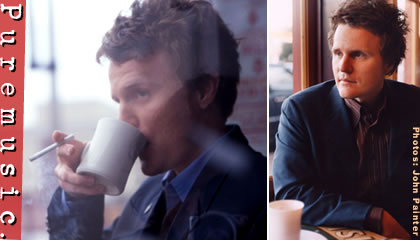
A Conversation with David Mead (continued)
PM: So why did you have to go to England? Who was producing that album, or what was happening that was English?
DM: It was a guy named Steven Hague, who's actually an American, but he's been living in England for a long time. This is the other record. the one that didn't come out. And the guy who was mixing it, his name is Tchad Blake--
PM: Oh, right, yeah.
DM: --and he pretty much likes to work at Real World Studios exclusively because it's close to his house.
PM: How do you like that...
DM: Yeah, I didn't complain at all.
[laughter]
DM: So that's what I was doing there.
PM: "I'm glad it's close to your house. It's 3,000 miles from mine."
DM: Yeah, right.
PM: [laughs]
DM: No, it was great, though. That's an amazing place to work. It was just very slow-paced, but it was definitely an experience.
PM: Let's talk about your very talented co-producer on Indiana, multi-instrumentalist David Henry.
DM: Well, let's see. I'd actually done a track with David that was on my first record, and I think that's probably when we met. And he was getting his studio up and just testing out his new gear more than anything, and wanted to do something. So I came over and we did this song called "She, Luisa." It turned out so good we just basically used that version for the record. And this one, Indiana, we started because we had played some gigs together, and one of the new songs that we were doing was "Nashville," the first song on the record.
PM: Right.
DM: And he was like, "Man, I've got a new studio now and I would really like to cut that. Do you want to just come over and try it?" I went, "Yeah, sure." So we did that and then we did a few others. And they just all sounded so good, and he's so incredibly easy to work with.
PM: Yeah, what a guy.
DM: Yes. Very, very transparent and attentive. And that was definitely how I wanted to be doing it. So we kind of holed up in his place on 12th, and as I said, over kind of a long period of time, a lot of short sessions, that's how we did it.
PM: Wow. Is Brad Jones playing upright, or as you put it, concert bass on all the tracks?
DM: It is an upright bass. I thought that was a concert bass.
PM: I'm just not used to seeing that term on a pop record. I thought it was pretty classy.
DM: That's why I used it.
[laughter]
PM: And I wondered if Brad stipulated that it be listed as "concert bass." [laughs] So was the decision that it be upright bass made at the outset, or did that just kind of evolved tune by tune?
DM: Well, part of the ethic of the whole thing was just to limit ourselves to acoustic instruments. The only time we backed off of that was with Joe Pisapia's lap steel. And there's one song, "Beauty," where he finally broke down and put some electric guitars on it. But I'd seen Brad play upright before, and I think he has a really cool approach to it. He's such a melodic pop bassist, and he obviously knows his way all over an electric bass, but he's also really limber on an upright. But he doesn't come from a school of music that, I think, maybe more obviously lends itself to playing upright bass, so he has a certain way of playing it that I thought would work out really well, and I think it did.
PM: Yeah, he didn't come from any of the upright angles. He didn't come from bluegrass, jazz, or classical.
DM: Right.
PM: And so, as you say, he's got his own touch on the upright, as he does on electric. It's amazing. I remember not so long ago, when Brad heard that I was getting my own studio up, he said, "Hey, Frank, you got to pay to get me to track on electric bass. But if you want me to come in and play upright, I'll play for free." And this was a while back. So as soon as I saw that he was playing upright bass all over your record, I said, "Well, that's the end of that offer."
[laughter]
DM: Well, you'd be surprised. I've pretty much paid for the whole thing myself, so I didn't really have a lot to pay him with either. But he was very gracious about that.
PM: I just figured, "Oh, now he's a frickin' session guy on upright bass. Yeah, now he's gonna cost me..."
DM: [laughs] continue
print (pdf) listen to clips puremusic home